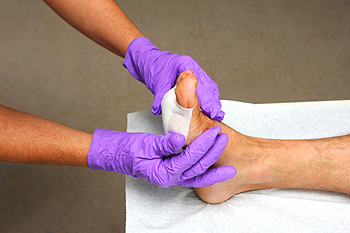The Seriousness of Diabetic Foot Ulcers

Diabetic foot ulcers pose a serious risk to those with diabetes, often flying under the radar until they become severe. The condition arises due to poor blood circulation and nerve damage, making it less likely for individuals to notice when their feet are injured. These ulcers typically occur on the soles of the feet or pressure points like the heels and toes, where friction and pressure are high. After a podiatrist removes dead tissue and cleanses the affected area, it is important to keep weight off the foot to prevent further complications and promote healing. Prevention is key, involving daily foot inspections, proper footwear, regular foot hygiene, and blood sugar management. Consulting a podiatrist is essential for diabetic patients to receive specialized care and guidance in preventing and managing foot ulcers. With their expertise, individuals can better safeguard their feet and overall well-being, avoiding the potentially devastating consequences of diabetic foot ulcers. If you have diabetes, it is strongly suggested that you add a podiatrist to your healthcare team.
Wound care is an important part in dealing with diabetes. If you have diabetes and a foot wound or would like more information about wound care for diabetics, consult with one of our podiatrists from Comprehensive Foot & Ankle Center of South Jersey. Our doctors will assess your condition and provide you with quality foot and ankle treatment.
What Is Wound Care?
Wound care is the practice of taking proper care of a wound. This can range from the smallest to the largest of wounds. While everyone can benefit from proper wound care, it is much more important for diabetics. Diabetics often suffer from poor blood circulation which causes wounds to heal much slower than they would in a non-diabetic.
What Is the Importance of Wound Care?
While it may not seem apparent with small ulcers on the foot, for diabetics, any size ulcer can become infected. Diabetics often also suffer from neuropathy, or nerve loss. This means they might not even feel when they have an ulcer on their foot. If the wound becomes severely infected, amputation may be necessary. Therefore, it is of the upmost importance to properly care for any and all foot wounds.
How to Care for Wounds
The best way to care for foot wounds is to prevent them. For diabetics, this means daily inspections of the feet for any signs of abnormalities or ulcers. It is also recommended to see a podiatrist several times a year for a foot inspection. If you do have an ulcer, run the wound under water to clear dirt from the wound; then apply antibiotic ointment to the wound and cover with a bandage. Bandages should be changed daily and keeping pressure off the wound is smart. It is advised to see a podiatrist, who can keep an eye on it.
If you have any questions, please feel free to contact our offices located in Cherry Hill, Voorhees, Atco, and Turnersville, NJ . We offer the newest diagnostic and treatment technologies for all your foot care needs.
